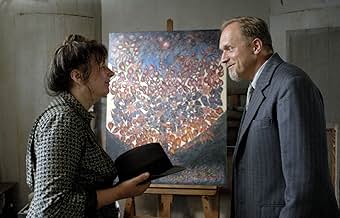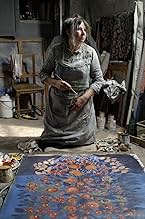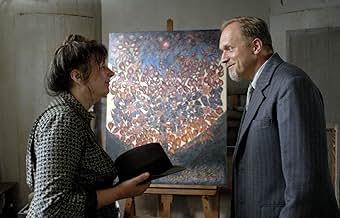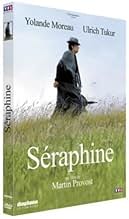Séraphine
- 2008
- Tous publics
- 2h 5min
NOTE IMDb
7,4/10
6,7 k
MA NOTE
Drame basé sur la vie de la peintre française Séraphine de Senlis.Drame basé sur la vie de la peintre française Séraphine de Senlis.Drame basé sur la vie de la peintre française Séraphine de Senlis.
- Réalisation
- Scénario
- Casting principal
- Récompenses
- 20 victoires et 10 nominations au total
Léna Breban
- Soeur Marguerite
- (as Léna Bréban)
Sandrine Bodenes
- Marie-Louise
- (as Sandrine Bodènés)
Anne Benoît
- Madame Delonge
- (as Anne Benoit)
Avis à la une
An artist. Fragile, gray, small. Some dreams. A fall. And drops of hope. Few images. A mecena. In fact, story of an ordinary existence. Testimony of forms of beauty . Words of a warm confession, with a brilliant Yolande Moreau and an great director. Everything is in best place. Light and cast, details and looks. And the air of small persons , delicate gestures, definition of art and art as refuge are pieces of this movie. So, it is not a biographic film. Seraphines are many men and women, basic instruments for others who believes that life is more than lies and hypocrisy. Beginning for discover of reality without appearance, sad and beautiful, poem about shadows of a fight, word of a late fame, "Seraphine" must be see again and again. In every Senlis lives a Seraphine.
Cinema is a language of deception. The set we see, the mise-en-scene, is what the director wants us to see. Conditioning us visually before an actor even speaks their lines. In costume dramas, the historical clothing is a further weapon to impress a specific artistic vision on us, further cloaking any subtext, whether the transformation of a marriage market story into 'rom-com' (Pride & Prejudice) or consciously travestying the past (Moulin Rouge!, Marie Antoinette). French cinema has achieved respected and less controversial use of costume with films like Jean de Florette and Manon des sources. In these examples, beautiful, nostalgic settings were contrasted with dystopian visions of the hard life. When we move to the biopic, cinematic techniques are routinely used to persuade us of 'what really happened.' Séraphine continues the proud French tradition of costume and historical drama, yet in a very accessible vein. It tells the (true) story of a minor French painter, Séraphine Louis (later known as Séraphine de Senlis, after the village where she lived.) Our story picks up Séraphine working as a maid for Madame Duphot. This lady of the house also rents an apartment to a German art critic-dealer, Wilhelm Uhde. Uhde believes in the 'primitive' artists and takes a liking to some of the maid's work he spots. Yolande Moreau's assured performance gives weight to what may be an unvarnished account. The discovery of the peasant woman's talent, her humble charm as she goes about collecting the ingredients for paint (wine, mud, fruits, flowers) as she goes about her chores as a domestic servant. Everything draws us sympathetically into Séraphine's world.
Udhe nurtures Séraphine's embryonic talent, ensuring it is seen worldwide. But as war hits the economy, support evaporates. Séraphine's inner voices of inspiration lead her to psychosis and she meets her demise in an insane asylum.
The painting itself is of the so-called 'naïve' style, characterized by childlike simplicity. (One of the most famous exponents, according to some, is L. S. Lowry.) The style seems natural to the childlike (if brilliant) personality of our peasant woman, although of course many naive art painters, including Lowry had, unlike Séraphine, plenty of schooling and formal knowledge of art technique.
Production values in the film are high all round. Costume, acting, direction, all achieve a high standard, as evidenced by the many awards heaped on it in its own country. The overall effect is touching without being sentimental.
Séraphine is a continuation of one woman's barely recognised legacy. Any subtext is about serving up a fine character from France's past, a commemoration of national greatness from the early 20th century. (Visits to the exhibition of her work in Senlis have, predictably, quadrupled since the release of the film.) If there is any ideological weakness, it is simply that held by the character herself, a Christian attitude of sacrifice and acceptance of fate. There is no strong judgement on whether Séraphine could have lived her life differently. No real analysis of her painting style. It is, after all, a classy and enchanting fairy tale hung on the hook of a historical person, a harmless deception perhaps. The viewer, should she or he wish, can make their own judgement. Just as they can on the deeply religious and fairly distinctive artworks she left for posterity.
Udhe nurtures Séraphine's embryonic talent, ensuring it is seen worldwide. But as war hits the economy, support evaporates. Séraphine's inner voices of inspiration lead her to psychosis and she meets her demise in an insane asylum.
The painting itself is of the so-called 'naïve' style, characterized by childlike simplicity. (One of the most famous exponents, according to some, is L. S. Lowry.) The style seems natural to the childlike (if brilliant) personality of our peasant woman, although of course many naive art painters, including Lowry had, unlike Séraphine, plenty of schooling and formal knowledge of art technique.
Production values in the film are high all round. Costume, acting, direction, all achieve a high standard, as evidenced by the many awards heaped on it in its own country. The overall effect is touching without being sentimental.
Séraphine is a continuation of one woman's barely recognised legacy. Any subtext is about serving up a fine character from France's past, a commemoration of national greatness from the early 20th century. (Visits to the exhibition of her work in Senlis have, predictably, quadrupled since the release of the film.) If there is any ideological weakness, it is simply that held by the character herself, a Christian attitude of sacrifice and acceptance of fate. There is no strong judgement on whether Séraphine could have lived her life differently. No real analysis of her painting style. It is, after all, a classy and enchanting fairy tale hung on the hook of a historical person, a harmless deception perhaps. The viewer, should she or he wish, can make their own judgement. Just as they can on the deeply religious and fairly distinctive artworks she left for posterity.
Veteran actress Yolande Moreau gives a dedicated performance in this biopic about the neo-primitive, or "naive," or "outsider" flower painter Séraphine Louis (1864-1948), now called Séraphine de Senlis, from the town where she worked. An orphan looked down on by all, she survived barely by doing cleaning and laundry paid by the job, but in her little room in town at night by candlelight made strange, visionary paintings of flowers in large clusters, looking like diamonds or insects. Raised and cared for in early life by nuns, she sang to the Virgin when she finished a painting. Beautifully photographed, meditative, with a strong sense of the quietude of rural France in the teens and twenties, this picture doesn't provide deep insight into either Séraphine or the German art collector who discovered and supported her, Wilhelm Uhde (Ulrich Tukur, another veteran; he has one of the secondary leads in The Lives of Others). Uhde deserves his own biopic. He was the first to purchase the works of Picasso and discovered the great modern primitive Henri "Le Douanier" Rousseau.
Slowly, methodically, the film shows how Uhde finds out by chance that the haggard looking middle aged woman cleaning up in the big rented house he's living in in Senlis with his sister is doing unique paintings on wood. Nobody else around appreciates them or, in fact, understands modern art. He buys all her work from Séraphine and urges her to concentrate on her art. But WWI comes, and as a German he is forced to leave precipitously, leaving behind his little notebook and most of the art he's collected in France.
Uhde returns years later with his sister and also a male lover, Helmut Kolle (Nico Rogner), a talented young German expressionist painter dying of TB, and rents another house in the area. He comes across Séraphine's work and finds it more ambitious and much more brilliant. He puts her on a generous monthly stipend. She shows signs of mania, and her disappointment when she finds the Paris exhibition must be put off due to the worldwide financial crisis leads her into insanity. The trajectory is ever downward, though the final scenes suggest that her last years in a sanatorium may have been spend it serenity, close to the nature she loved.
This film is thorough and handsomely made, but a little too much on the dutiful and academic side. It has parallels as a story with Bruno Nuytten's 1988 Camille Claudel, but it has neither the level of drama nor the presence of Gérard Depardieu and Isabelle Adjani (as Rodin and Claudel) to give it energy. As director Provost has said, Uhde had a "dark side": his willingness to virtually abandon Séraphine when things got rough for her, and not to bother looking for her when he first returns to France after the War. Provost leaves this mysterious, which is just historically, but unsatisfying cinematically. But Provost did apparently help organize the recent Musée Maillol exhibition of Séraphine's work. And this film is a thought-provoking addition to the on-screen literature of outsider or visionary art.
The film opened in theaters in Paris on October 1, 2008 to respectful if not overly enthusiastic reviews. It has been bought by Music Box in the US, but no release has been announced. Shown as part of the Rendez-Vous with French Cinema at Lincoln Center, NYC, in March 2009.
Slowly, methodically, the film shows how Uhde finds out by chance that the haggard looking middle aged woman cleaning up in the big rented house he's living in in Senlis with his sister is doing unique paintings on wood. Nobody else around appreciates them or, in fact, understands modern art. He buys all her work from Séraphine and urges her to concentrate on her art. But WWI comes, and as a German he is forced to leave precipitously, leaving behind his little notebook and most of the art he's collected in France.
Uhde returns years later with his sister and also a male lover, Helmut Kolle (Nico Rogner), a talented young German expressionist painter dying of TB, and rents another house in the area. He comes across Séraphine's work and finds it more ambitious and much more brilliant. He puts her on a generous monthly stipend. She shows signs of mania, and her disappointment when she finds the Paris exhibition must be put off due to the worldwide financial crisis leads her into insanity. The trajectory is ever downward, though the final scenes suggest that her last years in a sanatorium may have been spend it serenity, close to the nature she loved.
This film is thorough and handsomely made, but a little too much on the dutiful and academic side. It has parallels as a story with Bruno Nuytten's 1988 Camille Claudel, but it has neither the level of drama nor the presence of Gérard Depardieu and Isabelle Adjani (as Rodin and Claudel) to give it energy. As director Provost has said, Uhde had a "dark side": his willingness to virtually abandon Séraphine when things got rough for her, and not to bother looking for her when he first returns to France after the War. Provost leaves this mysterious, which is just historically, but unsatisfying cinematically. But Provost did apparently help organize the recent Musée Maillol exhibition of Séraphine's work. And this film is a thought-provoking addition to the on-screen literature of outsider or visionary art.
The film opened in theaters in Paris on October 1, 2008 to respectful if not overly enthusiastic reviews. It has been bought by Music Box in the US, but no release has been announced. Shown as part of the Rendez-Vous with French Cinema at Lincoln Center, NYC, in March 2009.
I enjoy French films very much and saw Seraphine in Paris. While the movie looks beautiful and the acting is excellent, overall the film bored me. There wasn't enough dramatic tension or intense character development to sustain my interest. I was very surprised that it won so many awards, but then again if the French academy is similar to the one in the U.S., they tend to play it safe. Seraphine is worth seeing if you are interested in thinking about the artistic soul. But there is nothing groundbreaking here. I would have liked to see a version of this artist's life that was less academic and more thought provoking. The one thing I admired very much was the performance of the lead actress. I was trying to imagine anyone equivalent to her in the U.S. and was unable to conjure any names. She is not classically beautiful, yet clearly she is an actress of great stature in France to have won this role. The lesson I took away from the film was the appreciation of talent, both of Seraphine and the actress who portrayed her.
10JustApt
This extraordinary biographical film tells the dramatic story of French paintress Séraphine de Senlis. The tale starts in the summer before the First World War when a known German art collector and critic Wilhelm Uhde accidentally finds out that his servant woman is an amateur artiste painting in naïve but highly innovative and original style. She was doing so because she had a vision of divine being who has told her to begin to paint pictures. Where does genius end and madness begin? Or are they just two sides of the same phenomenon? Questions poised by this artful drama hardly have the answers. To say that Yolande Moreau playing the role of Séraphine Louis is unique is to say the least. Camille Claudel is another brilliant movie in the same vein.
Le saviez-vous
- AnecdotesSince the film's release, the number of visitors at the museum of Senlis exhibiting Séraphine's works has quadrupled (August 2009).
- GaffesThe film opens in 1914 showing the arrival of Wilhelm and Anne-Marie at the village. Wilhelm actually arrived in 1912, two years before the start of the war.
- Crédits fousThe credits list the names of the paintings which are seen in the film - 10 paintings by Séraphine and the artworks owned by Uhde and Kolle.
- Bandes originalesConsonent laudes!
Written by Louis Rousseau
Performed by Yolande Moreau, Françoise Lebrun and Léna Breban
Meilleurs choix
Connectez-vous pour évaluer et suivre la liste de favoris afin de recevoir des recommandations personnalisées
- How long is Seraphine?Alimenté par Alexa
Détails
Box-office
- Budget
- 3 674 000 € (estimé)
- Montant brut aux États-Unis et au Canada
- 884 613 $US
- Week-end de sortie aux États-Unis et au Canada
- 38 637 $US
- 7 juin 2009
- Montant brut mondial
- 9 402 702 $US
- Durée2 heures 5 minutes
- Couleur
- Mixage
- Rapport de forme
- 1.85 : 1
Contribuer à cette page
Suggérer une modification ou ajouter du contenu manquant


































